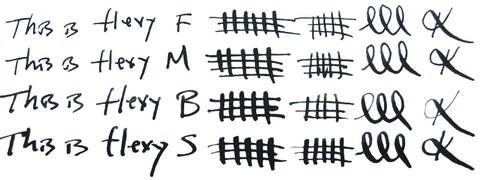Danitrio Autumn Poem Maki-E on Takumi Fountain Pen
Starting at $450/mo for 6 month no-interest installments, 10% down using 
Learn about our Payment Relief Plan. |
|---|
Couldn't load pickup availability
✓ 100% Genuine Urushi
✓ Contains the Maki-E Red Seal (Highest Quality of Maki-E Art)
✓ Hand-painted by highly-trained Japanese Artisans
Autumn Poems is an homage to the feelings of autumn in Japan. The day grows shorter and grains are ready for harvest. This pen evokes an autumn evening, with a dark red sky and vibrant moon.
Upon the pen is written a lyric poem that describes the atmosphere of a moonlit night in autumn. The poem is part of the Shin Kokin Wakashū, compiled in Japan in 1205:
How pure and bright and clear
is the light of the moon
that sometimes shines through
the clouds fluttering in the autumn wind.
However, the moon is immediately hidden
in the white clouds.
About Danitrio Takumi Fountain Pen Series:
The Takumi is Danitrio series pen that is cigar-shaped. Takumi means "good design or craft" in Japanese.
Nib Details:

This pen is furnished with an 18k Gold, two-toned #6 nib. What has been described by many Danitrio collectors as the fireball nib is an image of “Kaen-Kohai” which is a flame-shaped halo of “Fudo Myoo” (Acala, the God of Fire). This halo is commonly painted on the back of Japanese Buddhist statues.
An UrushiPen.com representative will contact you to confirm nib tip size preference (fine, medium, broad, or stub) following the placement of the order.

Technical Specification:
| Cap Length | 68 mm (2.68") |
| Cap Diameter | 18 mm (0.71") |
| Barrel Length | 107 mm (4.21") |
| Barrel Diameter | 16 mm (0.63") |
| Pen Length (Closed) | 147 mm (5.79") |
| Pen Length (Posted) | Cap does not post |
| Net Weight | 28.4 g (1 oz) |
| Net Weight (w/ink full) | 30 g (1.06 oz) |
| Filling System | Cartridge/Converter |
About the Artisan:

This pen was hand-painted by Koichiro Okazaki (Kogaku). Born in 1959. He is a renown Maki-E artisan in Japan and considers himself wholeheartedly traditional when it comes to Maki-E. Many of his Maki-E works have been accepted and rewarded at national art exhibitions. He had learned Maki-E from a master and became an independent artisan 5 years later. He was recognized with Kao (authorized monogram) by Kuda Munenori of Sado Omote school in 1991. He performs Maki-E on many traditional accessories, hair pins, combs, jewelry, and fine writing instruments.




